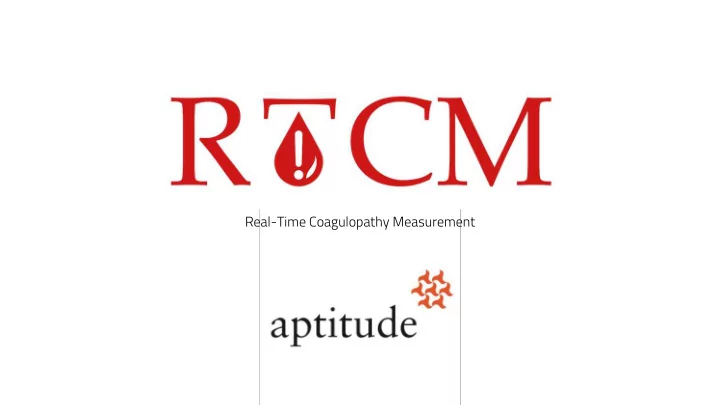

Real-Time Coagulopathy Measurement 1
Development Team Justin Hemphill Trenton Rochelle Ziming Qi
Overview ● Coagulopathy of Trauma – A hypo-coagulable state caused by trauma, resulting in increased bleeding or clotting, heightened resuscitation requirements, and a 4x increased rate of mortality. ● Car accidents, shootings, bad falls... ● To minimize mortality, coagulopathy must be assessed and addressed nearest to the time of injury and monitored throughout the course of care.
Problem with Current Solutions ● Measurements can only be taken in a hospital/lab setting ● Can take up to an hour ● Seconds matter when treating a critically injured person
Aptitude’s Solution ● Proprietary molecule that binds to receptors in a person’s blood. Electrochemical signals produced by the molecular binding give coagulopathy measurement. ● Developed a handheld sensor analogous to a blood glucose meter ● 30 second test
Current Solution Aptitude’s Solution Location Hospital/Lab Portable Time ~ 1 hour < 2 minutes Size Stationary Machines Handheld User Doctor/Lab Technician First Responder
Alpha Prototype
Our New System
Main Product Requirements Handheld and field-ready during an emergency ● Blood within the sensor needs to be stable at various goal ● temperatures (15-60°C) Needed for different tests + future development ○
Goals Temperature control ● Integrate modules into a PCB ● Provide future feature expandability ● Device charging in-use ● Redesign enclosure ● Quick and reliable readings ●
Design Limitations No bluetooth ● Long battery life ● Handheld ● Work while charging ● Work with Android ●
Simplified Block Diagram
Core Modules
Central Processor SAMD21 Cortex-M0+ ● Low power 32-bit ● 48MHz Clock ● SPI/UART/USB + GPIO + PWM ●
Emstat Pico Highly compact potentiostat used for ● electrochemical measurements Provides coagulopathy measurement ●
Power System Battery: PKCELL Li-Po rechargeable battery ● 3.7V ● 2500mAh ● 50mm x 50mm x 7mm ● Use: Supply system power ● Battery Controller: PowerBoost 1000C ● Boosts output to 5V ● Battery level reading ● Safely charges Li-Po Battery from USB ● Charge + Use simultaneously. ●
Temperature Control Peltier Module: Heats + Cools the blood chip ● 25mm x 12mm x 3mm ● 6.0-9.0V operating voltage ● 800mA draw ● Voltage changes as temperature changes ● H-Bridge device alternates current ●
Temperature Readings Surface Mount Thermistor (PT100): Responsive thermal equilibrium ● Thin Film ● Digital Amplifier (MAX31865): Read temperature every 100ms ● 0.02 ℃ resolution ● Thermistor atop Peltier Connected to Thermistor ● Side View
Peltier Control Function 1. Input: Temperature ( ℃ ) 1. Output: PWM Duty Cycle (0-100%) 1. Using two PID controller objects i. One for heating ii. One for cooling
Proportional-Integral-Derivative (PID) Control loop mechanism employs feedback ● Continuously calculates an error value e(t) as the difference ● between a desired setpoint y(t) and a measured process variable r(t) Applies a correction based on proportional, integral, and ● derivative terms
PID Tuning - Kp, Ki, Kd Target Amplitude Time
Heating PID - No Enclosure Results Converges to +10 ℃ in around 7-8 seconds!
Cooling (more difficult) Working against ambient temperature Created an enclosure for thermal isolation Heat from bottom side diffuses into colder side High temperature gradient reduces efficiency Attached heat sinks } Δ T = temperature gradient
Enclosure Design
Enclosure Design
Heating Improvement 25°C to 37°C in 4 seconds (50%) 25°C to 60°C in 20 seconds 4
Putting It All Together
PCB Revision 1 ● 2-Layer ● Single-sided ● 45mm x 75mm
PCB Revision 2 ● 4-Layer ● Double-sided ● 45mm x 63mm (12mm shorter) ● Blood reading system included
Top Bottom
Android Application ● Microprocessor-Android communication while also charging ● Microprocessor data can be changed in-app with JSON messages ○ {"mode":"set","modeType":"isTempControlling","modeData":[1]}
Developer Settings
● Scan Start Scanning App ● Status Info ● Temperature
Acknowledgements Scott Ferguson, PhD, CEO and Founder, Aptitude Inc. Radhey Patel, Electronics Engineer, Aptitude Inc. Yoga Isukapalli, Professor and Capstone Chair, UCSB ECE. Aditya Wadaskar, Teaching Assistant, UCSB ECE. Kyle Douglas, Teaching Assistant, UCSB ECE.
Recommend
More recommend